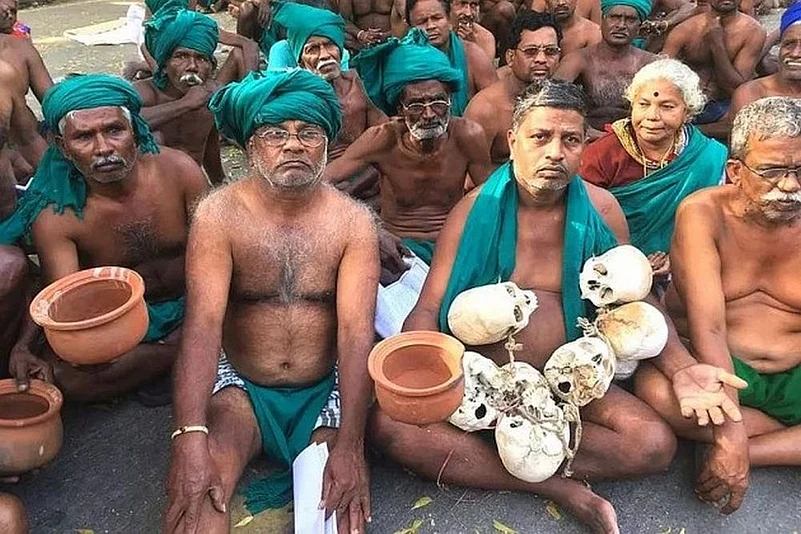
Tamil Nadu Farmers Receive Rs 5, Rs 10 Cheques As Compensation For Crop Loss
The state government has admitted to the error, which they say happened during the disbursal of cheques in certain villages of Dindigul.

Tamil Nadu Farmers Receive Rs 5, Rs 10 Cheques As Compensation For Crop Loss
Tamil Nadu Farmers Receive Rs 5, Rs 10 Cheques As Compensation For Crop Loss
Farmers in Tamil Nadu’s Dindigul received compensation cheques of as low as Rs 5 and Rs 10 in many parts of the state. The cheques have been issued by the Dindigul Central Cooperative Bank Ltd in a bid to alleviate farm distress, reported The Times of India.

(Source: Twitter)
The Hindu reported that leader of the Opposition in the legislative assembly MK Stalin on Wednesday also raised the issue, while his party MLA K Pitchandi was participating in a debate on the state budget. Pitchandi had brought a few such cheques to the House.
“Just Rs 5 and Rs 10 relief for an acre of distress?,” asked Stalin. The government was taking pride in realising Rs 3,113 crore from insurance companies towards compensation claims last year, dubbing it a historic development, reported ToI.
According to the ToI report, the state government has admitted to the error, which they say happened during the disbursal of cheques in certain villages of Dindigul. The state government added that it has ordered insurance companies to rectify the “clerical errors.”
Farmers are eligible to receive up to Rs 26,000/acre of paddy based on yield loss, Rs 12,000 for pulses, and up to Rs 20,000 for millets as compensation under crop insurance. The farmers have been demanding a drought relief package of Rs 40,000 crore, farm loan waiver and setting up of Cauvery Management Board by the Centre, the report added.
The Hindu report added that minister for cooperation Sellur K Raju said such complaints had been received from five farmers in Dindigul and another was reported from Nagapattinam. “The collectors have been directed to look into the issue and take appropriate action,” he said.
OS Manian, minister for textiles, said there was shortage of staff and most of these issues had occurred due to clerical errors.
As many as 6,351 farmers/cultivators committed suicide in 2016 across India, or 17 every day, according to the latest home ministry data. Suicides declined 21% from 8,007, or 22 every day, in 2015, data show.
According to a recent IndiaSpend report, suicides in the farming sector declined 10% – from 12,602 in 2015 to 11,370 in 2016 – according to this reply to the Lok Sabha (lower house of Parliament) by Parshottam Rupala, minister of state for agriculture and farmer welfare, on March 20, 2018. The minister’s reply, based on provisional data from the National Crime Records Bureau (NCRB), a division of the home ministry, did not reveal the causes for suicides in 2016.
However, farmer suicides in Tamil Nadu increased 18 times from two in 2015 to 36 in 2016. In all, 381 suicides in agriculture sector were reported in Tamil Nadu in 2016.
As many as 144 cultivators and agricultural labourers ended their lives in Tamil Nadu between October and December 2016, and 106 farmers were reported to have committed suicide in one month, IndiaSpend reported on January 10, 2017.
In April and July 2017, a group of farmers from Tamil Nadu had stationed themselves at Delhi’s Jantar Mantar after the Tamil Nadu government declared a drought in the state.
The protesting farmers demanded loan waivers, revised drought packages, a Cauvery Management Committee, and fair prices for their products, among other things. Clad in green loincloths, the farmers shaved their heads and half their moustaches, put mice and snakes in their mouths, conducted mock funerals, flogged themselves, stripped at Raisina Hill, and carried skulls of farmers who committed suicide due to debt pressure. The protests were called off after a meeting with Tamil Nadu chief minister Edappadi Palaniswami who promised to write off loans from nationalised banks and offer a revised drought package, reported Hindustan Times.
Published At:
MOST POPULAR
WATCH
MORE FROM THE AUTHOR
PHOTOS
×





















